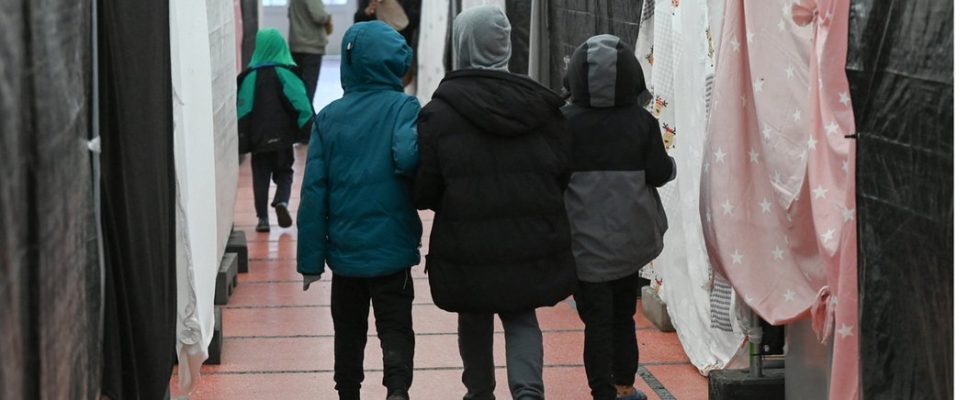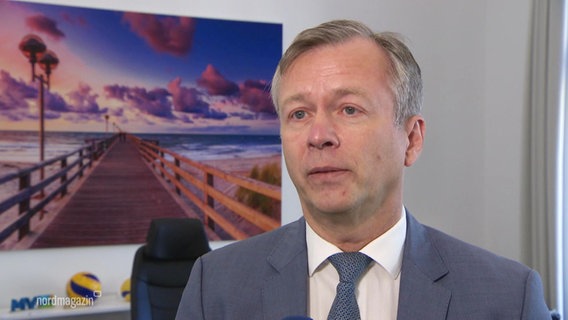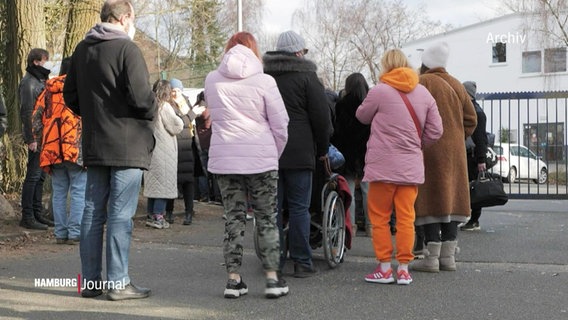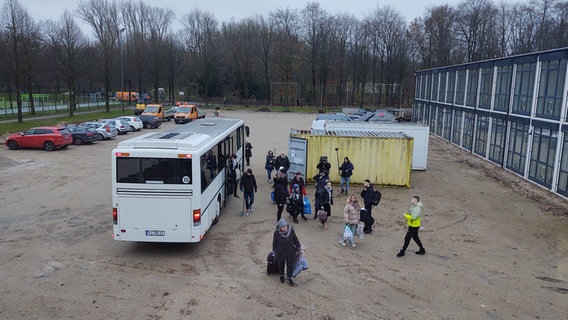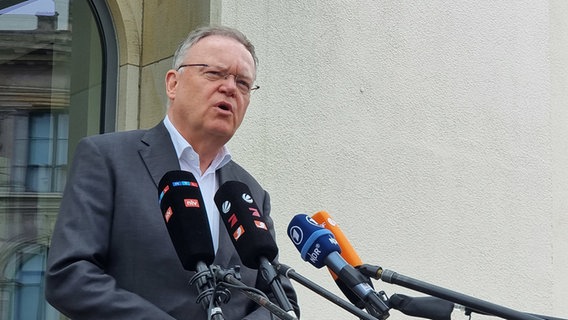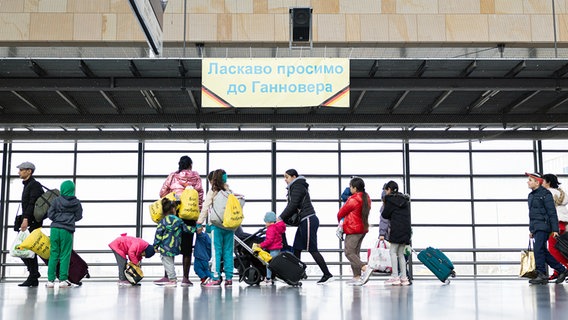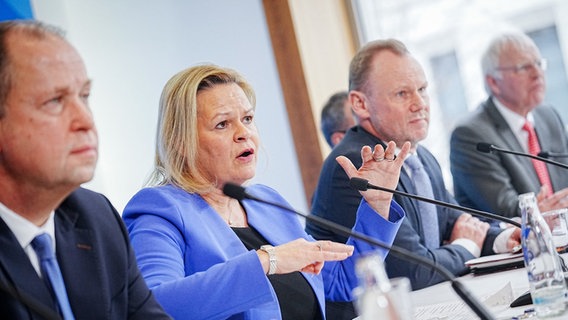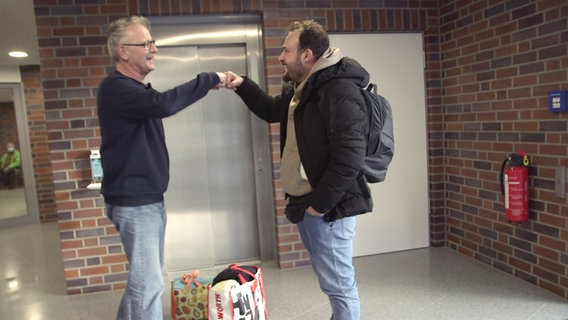Status: 05/08/2023 8:47 p.m
Refugees have to be housed and fed by the federal states and municipalities, but the federal government only pays an annual flat rate, not per capita. Before the refugee summit on Wednesday, the prime ministers of Lower Saxony and Schleswig-Holstein criticized this. The federal government rejects further financial commitments.
Against the background of the tense situation in refugee accommodation and care, Lower Saxony’s Prime Minister Stephan Weil (SPD) referred to the joint responsibility of the federal government for the accommodation and integration of refugees at a press conference in Hanover. Financially he had to “move considerably”. The financial contributions from the federal government should be based primarily on how many people come to Germany – “because that’s a number that the federal states and municipalities definitely cannot influence”. An annual flat rate regardless of the number of people seeking protection is not enough.
Günther: “Calls for help don’t seem to arrive in Berlin”
The Prime Minister of Schleswig-Holstein, Daniel Günther (CDU), also criticizes the fact that the federal government has canceled the previous financing model, according to which the federal government pays more money if more refugees come. Now the federal government only pays a lump sum, and “we think that’s absolutely not appropriate.” The federal government must again assume 100 percent of the costs of accommodation. The prime minister expects not only financial help from the federal government, but also political ones. A limit on immigration, more repatriations, “because we are obviously reaching the performance limits in all parts of Germany. And here we expect answers.” Apparently, the calls for help from the municipalities would not reach Berlin.
Dressel: “The attitude of the federal government is not acceptable”
Hamburg’s Finance Senator Andreas Dressel was also critical in an interview with NDR 90.3: “The attitude of the federal government is neither wise nor acceptable.” The SPD politician justified this with the high expenses that Hamburg also has for the integration of refugees. “My expectation towards the federal level is that more needs to be done.”
Schwesig: “Dispute between the federal and state governments keeps the mood on the ground boiling up”
Mecklenburg-Western Pomerania’s Prime Minister Manuela Schwesig (SPD) advised the federal government not to let it come to a dispute. The topic of refugees is highly sensitive, she told the NDR Nordmagazin: “On the one hand, we have the responsibility to protect and on the other hand, there is also a lot of resentment on the ground because we are practically at the borders.” If the federal and state governments did not agree, the mood would continue to escalate. Finance Minister Heiko Geue (SPD) said the federal government’s refusal to increase support was “unacceptable”. He expects “the solidarity of the federal government on this important issue”.
Bremen relies on splitting the costs equally
Bremen’s Mayor Andreas Bovenschulte (SPD) is committed to the dispute over the financing of refugee aid for the costs to be shared equally between the federal and state governments. “If we could enforce 50:50, that would be a big step in the right direction,” said the SPD politician on Monday to broadcasters RTL and ntv.
The federal government appeals to the responsibility of the federal states
Government spokesman Steffen Hebestreit reacted on Monday to the criticism of the course taken by the federal government and appealed to the states’ willingness to compromise. Caring for the refugees remains a joint task to which the federal government, states, cities and municipalities are called upon. At the same time, he rejected calls for more money from the federal government. However, it is not acceptable if the municipalities do not take on the necessary tasks due to a lack of money, support is needed. This must now be discussed.
Regarding the demands of the federal states for a per capita flat rate for refugees, Hebestreit said that the federal states had rejected such a flat rate two years ago. As a result, there were changes in other places, Hebestreit explained, referring, among other things, to the higher share that the federal government bears in the cost of accommodation.
Agency: countries accuse the chancellery of incorrect calculations
According to information from the Reuters news agency, the federal states accuse the Chancellery of incorrect calculations. The federal government has actually reduced its aid – despite the increasing number of refugees. According to Reuters, the federal states are demanding, among other things, a flat rate of around 1,000 euros per refugee.
The federal government has a different point of view when it comes to financing. According to ARD information, she points out in a draft paper that the federal government is already providing aid worth billions despite budget deficits, while the states and municipalities have surpluses. According to the Basic Law, they are responsible for financing themselves. The federal government has also voluntarily assumed services in recent years.
What the federal government is already paying for
For the current year, the federal government has pledged 1.5 billion euros for refugees from Ukraine, as well as a general refugee-related lump sum of 1.25 billion euros. In addition, the federal government pays social benefits for Ukrainian war refugees and for recognized refugees from other countries who do not earn their own living.
Germany took in around 1.2 million people seeking protection last year – around a million of them came from the war-torn Ukraine. Refugees from there do not have to apply for asylum. Almost 245,000 people from other countries applied for asylum in Germany – most of them come from Syria, Afghanistan and Turkey.
Green leader Lang supports the demands of the federal states
Before the refugee summit, Green Party leader Ricarda Lang agrees with the demands of the federal states for more financial support from the federal government – deviating from the previous line of the traffic light coalition. In the report from Berlin on ARD, she said that the cities and communities had achieved incredible things last year. The people from Ukraine were quickly brought into educational institutions and work. But there are also major problems in certain areas, so concrete solutions are needed, including financial ones.
Further information


